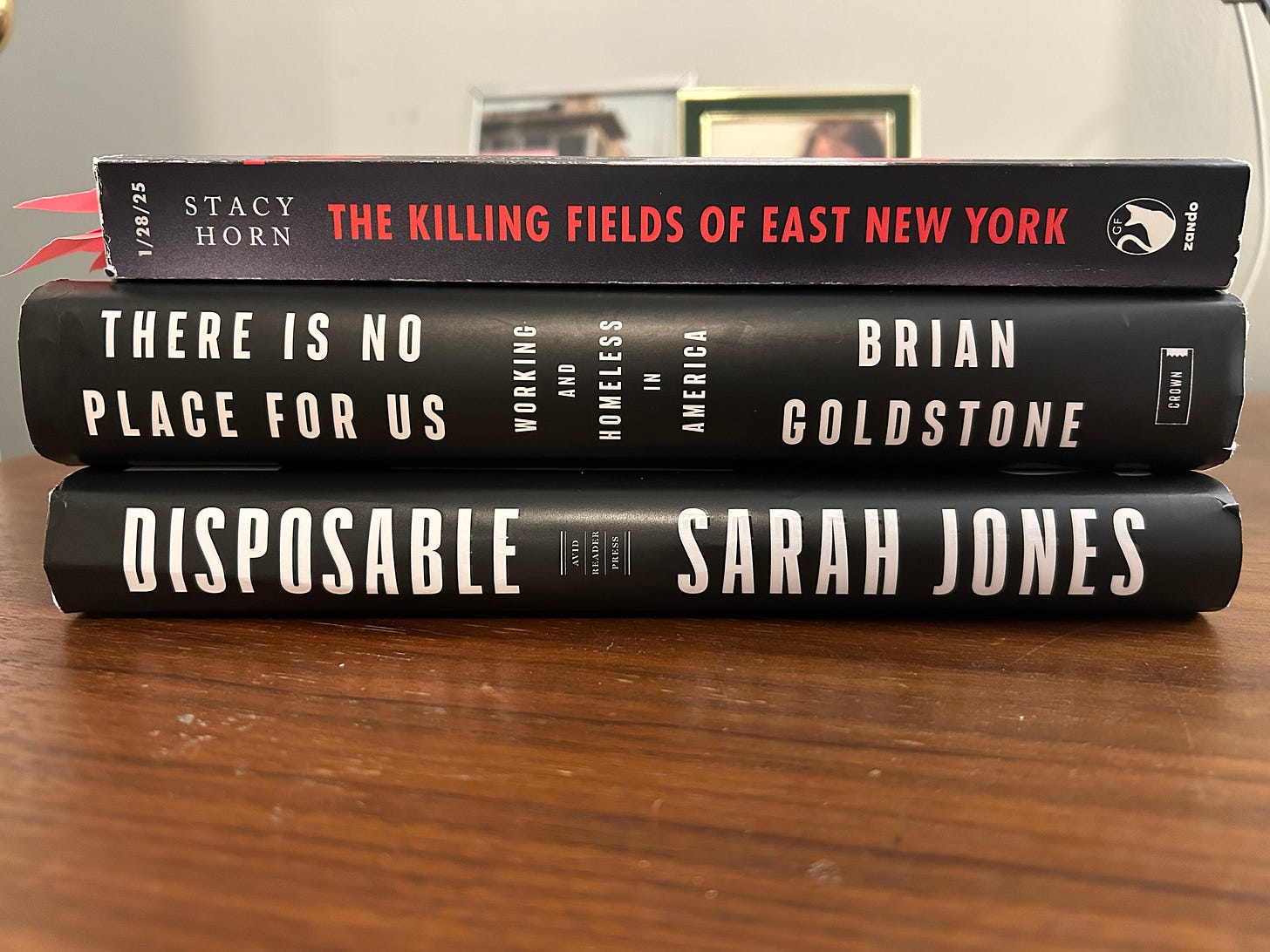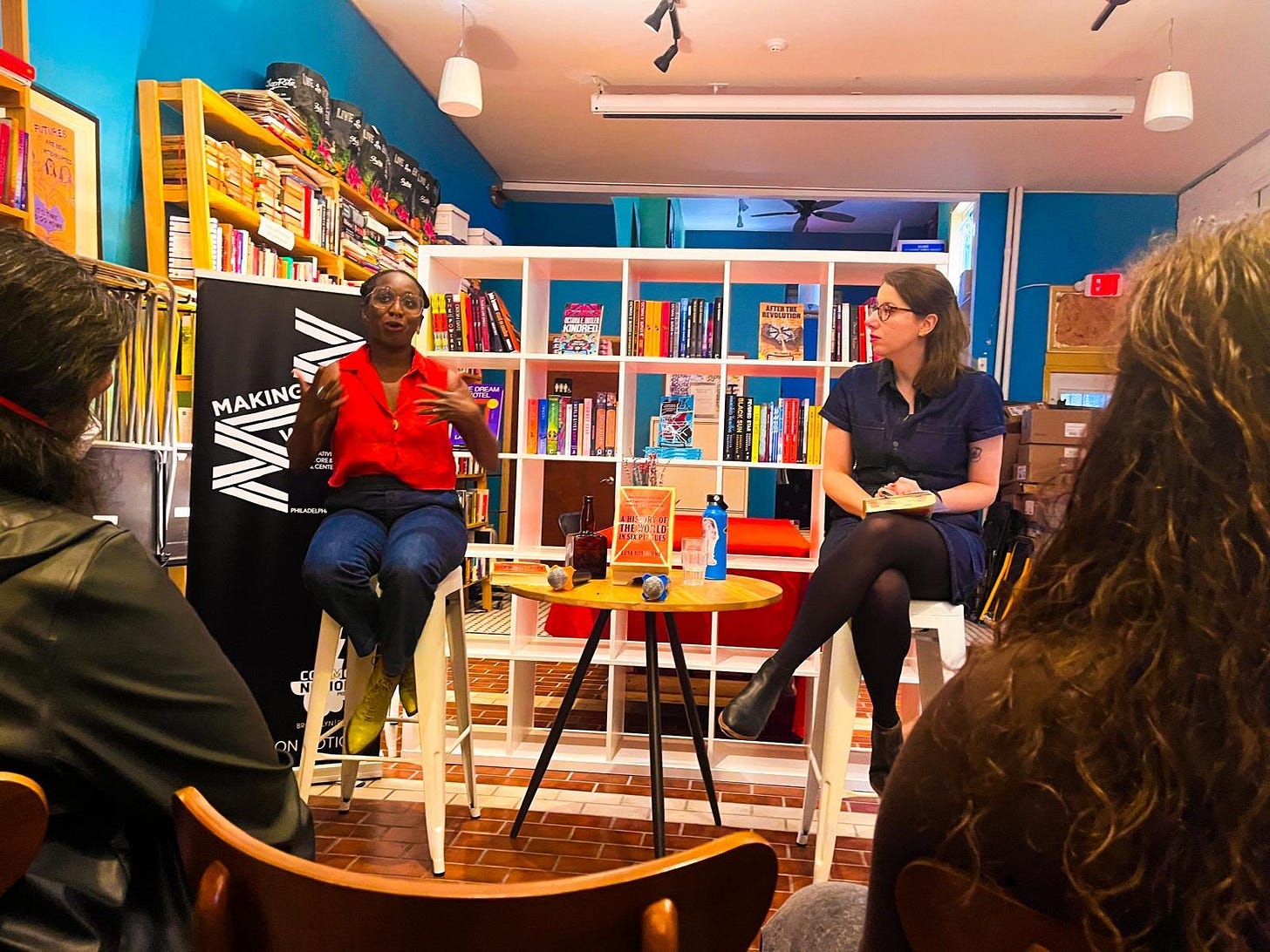What I'm Reading/What I'm Writing
On housing fraud and homelessness, "disposability," and epidemics, plus a radio interview and an upcoming event
When my book came out in late January, I told people I would take it easy work-wise in February to give myself a bit of a break. That is the opposite of what happened, because my February—and the first two weeks of March—turned out to be filled with a torrent of deadlines. This was a good problem to have as a freelancer, as it’s great to have editors say yes to your pitches, and yet it also left me working for 11 days straight at one point. One only has so much control over their own schedule as a freelancer!
Two of the pieces I was working on in these recent weeks have now been published, as has one that I finished up my work on a bit ago. Despite the harried nature of seeing these assignments through, I am very glad to have had the opportunity to draw attention to four eye-opening nonfiction books, which all grapple in some way with how society leaves certain people and places behind.
For The Nation, I reviewed Stacy Horn’s The Killing Fields of East New York: The First Subprime Mortgage Scandal, a White-Collar Crime Spree, and the Collapse of an American Neighborhood. Horn traces how two 1968 laws that aimed to make homeownership more accessible to low-income families of color inadvertently created the subprime mortgage industry, which incentivized fraud. Some officials at the Federal Housing Administration were in on the scheme. Horn focuses on how the Brooklyn neighborhood of East New York—which had already been hit by racist redlining and blockbusting—was further decimated by the FHA scandal, creating a vacuum in which violent crime proliferated. This is a gripping and damning read.
Continuing the housing theme, for The Washington Post, I reviewed Brian Goldstone’s There is No Place for Us: Working and Homeless in America, with a short detour into Sarah Jones’s Disposable: America’s Contempt for the Underclass. Both Goldstone and Jones force readers to reckon with how American society has drawn lines that assume certain people are undeserving of security, in health and in housing.
There is No Place for Us challenges the status quo understanding that homelessness and employment are mutually exclusive, following five Black families in the Atlanta area who are employed in low-wage work and struggle to stay housed. This is an indispensable book, and I believe it will be held up as a paragon of narrative nonfiction for years to come. Disposable has a much wider scope, as Jones uses the pandemic to illuminate how societal conditions left certain groups of people vulnerable to premature death. It serves as a timely reminder of lessons we need to hold onto from the pandemic. For instance, remember when Governor Andrew Cuomo issued a disastrous order that unleashed Covid-19 in New York nursing homes and later tried to conceal the death toll at these institutions? Don’t vote for this fool for NYC mayor!
Speaking of the pandemic, on March 11, the five year anniversary of the WHO declaring Covid-19 a global pandemic, my friend Edna Bonhomme released A History of the World in Six Plagues: How Contagion, Class, and Captivity Shaped Us, From Cholera to Covid-19. I was thrilled to talk with Edna about the book for The Baffler, and later to have a different discussion publicly at Making Worlds Bookstore here in Philly.
Edna and I know each other from our organizing work for book critics in the Freelance Solidarity Project. She’s also a medical historian and has studied public health and microbiology, and she brings all of that knowledge to bear in this study of how contagions like Covid-19 spread in ways that both reflect and reproduce societal divisions that are born out of how we define who is deserving of health, autonomy, and care.
Amid all the deadlines, I had a really interesting conversation about my book and capitalism live on the radio with Chuck Mertz over at the perfectly named show “This Is Hell!” The recording is available here and wherever you listen to podcasts.
And finally, I’m going to be in Los Angeles later this week for the AWP Conference! For fellow writers who will be attending, please come check out the panel I’ll be moderating on braiding memoir with research and reporting on Saturday afternoon (details in the graphic below). Our panel lineup is truly stellar: Sasha Bonét, Lilly Dancyger, Melissa Febos, and Heather Radke!







I found out about the FHA scandal just last year during a module I was taking for my Masters program and I was speechless! It’s interesting to know that there’s a book written about it. I’ll make time out to read it. Thanks for sharing
thankyou for the informative insights, kristen.
im a first timer here and glad to have been recommended such books by an author herself.
all the best for your upcoming book release<3